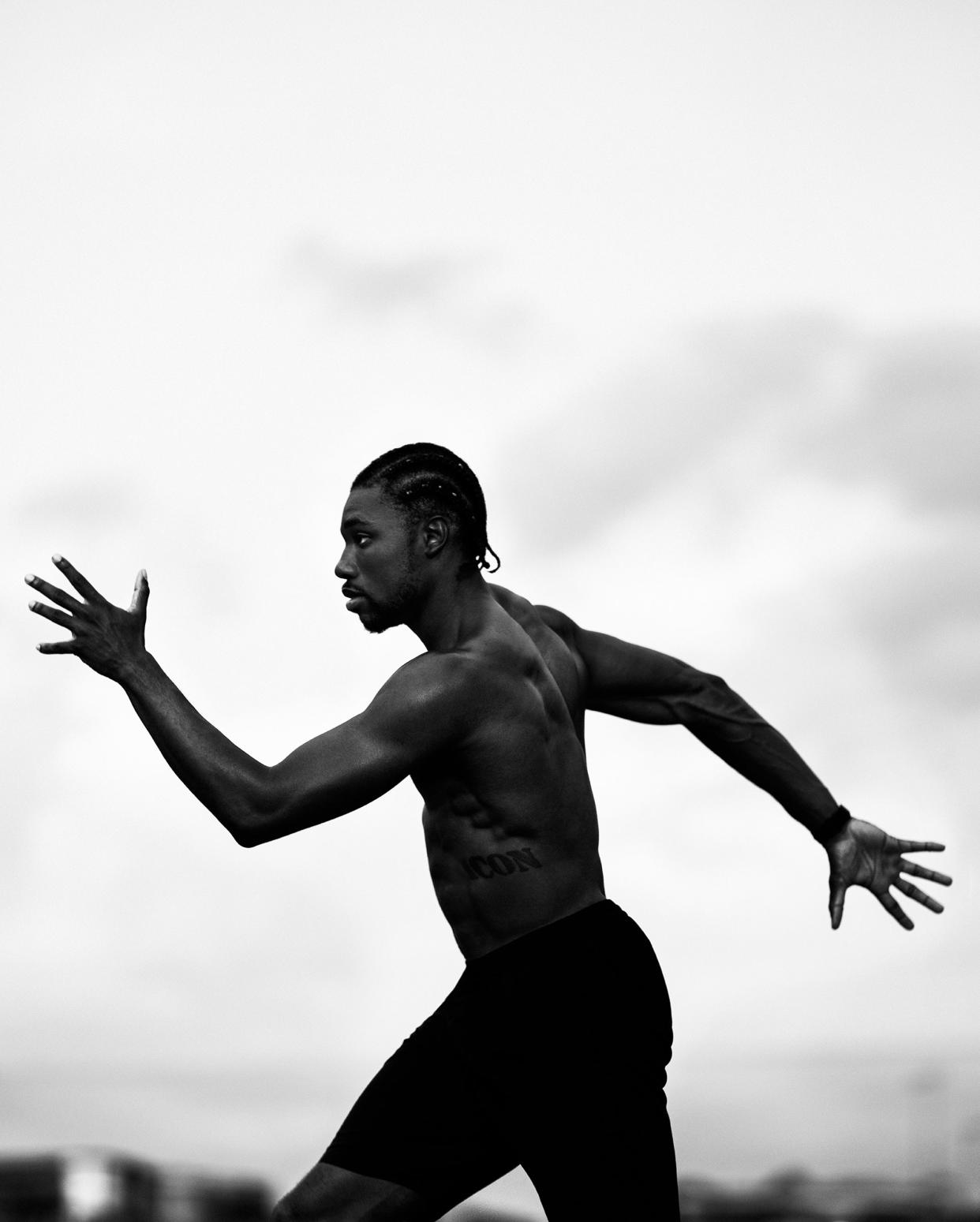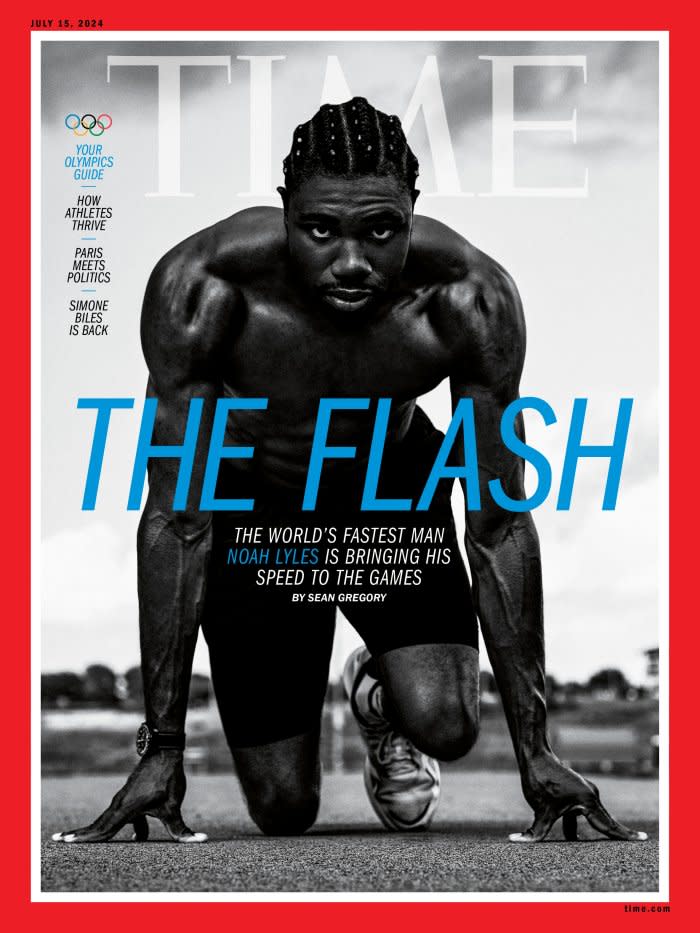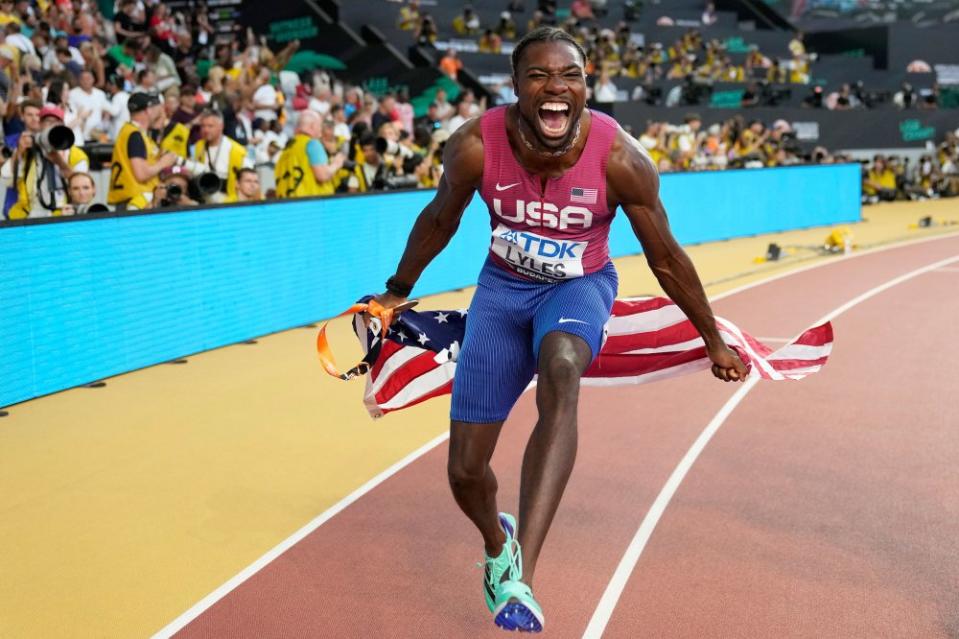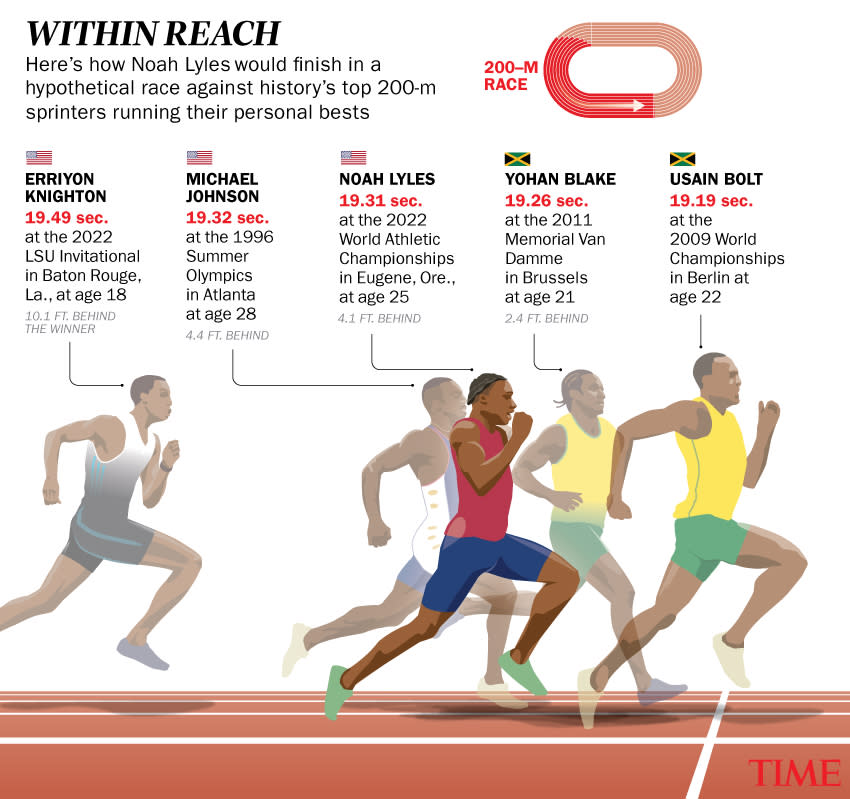Noah Lyles Brings His Speed and Sizzle to the Paris Olympics

Credit - Dana Scruggs for TIME
Noah Lyles should be a miserable human on this suffocatingly hot May morning near Orlando. Two nights earlier, the U.S. sprint star was up until 3 a.m. in the Bahamas, waiting on a delayed drug test after a race. You can still spot fatigue under his eyes.
Lyles, however, can summon social energy on command, and today he’s yapping away between stretches and sprints: about his love of anime, how he needs a pedicure, how he’s the most fashionable guy in all of track and field. He had been absent from the past few practices while running in Nassau, where he and his 4 × 100-m relay team took first place. “We did miss you,” one of Lyles’ training partners, Paralympic sprinter Nick Mayhugh, tells him. “But did we enjoy the peace and quiet of the past two days? Yes.”
Lyles runs a 120-m practice sprint in 12.4 sec. “You don’t have to run any faster than that,” says his coach, Lance Brauman. “You ran fast twice this weekend. You don’t have to do it again.” Lyles isn’t feeling this advice. “My body’s turned on!” he says. “I can feel the rust coming out of the legs! These two are going to be faster.” Brauman rolls his eyes. Lyles runs the next two in 12.2 and 11.9 sec., respectively.

Talk turns to Lyles’ competitors, including Letsile Tebogo of Botswana, who won a silver in the 100 m and bronze in the 200 m at last year’s World Athletics Championships in Budapest. Lyles won gold in both races. “He’s definitely a once-in-a-generation talent,” Lyles says. I ask Lyles if such a threat worries him. “I’m here to race anybody who wants it,” he declares. “The deeper the field, the better I run. I know I’m going to win. Because I’m never going to break nerve.”
The Paris Olympics, which begin on July 26, are set to go down as the Noah Lyles Games. If Lyles, 26, repeats his Budapest feats and wins the 100-m, 200-m, and 4 × 100-m relay golds, he’ll be the first American track-and-field athlete since Carl Lewis, 40 years ago, to win that triple, and the first male athlete to do so since Usain Bolt in 2016. Now Bolt is no longer in the starting blocks, and Michael Phelps is out of the water. Katie Ledecky is in the pool but a more low-key presence, and everyone already knows Simone Biles is a legend. The stage appears set for the World’s Fastest Man, the title Lyles took with his 100-m win at worlds, to steal the show. He’s even made noise about chasing a fourth gold, in the 4 × 400-m relay. No male track athlete has ever won that many sprint golds at a Games. (Americans Carl Lewis, Jesse Owens, and Alvin Kraenzlein each won a fourth, but in the long jump.)
If Lyles piles up golds in Paris, “we may have to recalibrate who is America’s biggest star,” says NBC analyst and four-time Olympic medalist Ato Boldon. “With the Olympics being next in Los Angeles and him being right in his prime for those four years leading up to LA28, look out. He’s going to be huge.”
Lyles, who has shot ads for Adidas, Visa, NBC, and others, seems tailor-made for this moment. An outspoken extrovert with ICON tattooed on his torso, he’s begun a tradition of walking into track events in splashy outfits to attract attention. He’s stronger, physically, than he was three years ago, when he won a disappointing bronze in Tokyo. More important, he’s in a better headspace, no longer fighting the demons that haunted him during the pandemic Games.
“Being able to run with passion, and a smile on your face, and turning a race into something for everybody to enjoy, that’s what I consider running with soul,” Lyles says during an extended conversation in the living room of his four-bedroom house in Clermont, Fla., after training. He’s sitting under a white blanket on his couch, legs stretched out. “It just means that I’m happy,” he says. “I love to do what I do. And that’s a dangerous guy.”

Lyles’ parents Kevin Lyles and Keisha Caine Bishop were both collegiate track stars at Seton Hall University. But they couldn’t envision Noah, the oldest of their three children, following in their footsteps—Lyles suffered from such severe asthma as a child that he didn’t have plush toys or teddy bears, because they could gather dust and aggravate his condition. As he struggled to fill his airways, his cough sounded like a high-pitched bark. “One day I was on a conference call for work,” says Keisha, “and the supervisor said, ‘Could somebody take their dog out?’”
They eventually found a medication that helped him breathe comfortably. But as Lyles entered middle school, he faced another obstacle: bullying. His teeth had become discolored—Lyles believes the medicine caused them to yellow—and classmates, particularly girls, teased him. “They were ruthless,” he says. “An emotional beating, that’s the stuff that really breaks you down.” Lyles was also diagnosed with ADD and dyslexia, which made school difficult for him.
Read More: Sunny Choi Is Heading to Paris for Her Sport's Olympic Debut. Just Don't Call It 'Breakdancing'
He gravitated toward art, drawing Spider-Man swinging down a cityscape and, later, designing the uniforms for his high school track team. Lyles attended church dressed as Peter Pan and climbed on the shelves at Costco. “He was that kid who was just always trying to test things out,” says Kevin.
Lyles eventually found an outlet for his rambunctiousness: sports. After Keisha and Kevin divorced in 2008, when Noah was around 11, the kids moved with Keisha from Charlotte, N.C., to Alexandria, Va., where Noah and his younger brother Josephus attended T.C. Williams High School (now called Alexandria City High School) and ran track. Noah practiced longer and harder than anyone. “I have everybody else tired and throwing up, but I can’t get him,” says Rashawn Jackson, Noah’s high school sprint coach. “This is not right.” While watching the opening ceremonies for the 2012 London Olympics, Noah and Josephus, just a year apart in age, made a pact to make the team for Rio. Noah finished fourth in the 200-m trials in 2016, just missing the cut; Josephus was injured.

Noah and Josephus both turned professional in 2016: they’re believed to be the first male sprinters in the U.S. to bypass college for the pros. (Josephus did not qualify for the Tokyo Olympics but is seeking to make the team for Paris.) Lyles broke the 300-m indoor world record in his first pro season, in 2017. But in the weeks before his first outdoor world championships in Doha in 2019, he grew homesick living out of hotel rooms in Europe. Keisha visited him in Amsterdam, bringing his favorite cereal, Raisin Bran Crunch. “I really learned at that point this is not a glamorous life,” says Lyles. “This is a hard-fought, dog-eat-dog life that you’ve got to get through.”
Winning the 200 m at those worlds did little to improve his morale. “I just remember crossing the line being so empty,” says Lyles. Then the pandemic, which hit a few months later, left him isolated. “Noah has a twinkle,” says Cheryl Tardosky-Anderson, his longtime therapist. “He didn’t have that twinkle.”
Read More: Fred Richard Is Team USA's Next Olympic Hope for Men's Gymnastics
“I could barely talk,” says Lyles. “I was so tired. All the time. Even thinking was a drain. It felt like you were almost in a constant asthma attack. You know there’s more room in your lungs, but you can’t physically use the muscles to actually take that breath.” George Floyd’s murder, in May 2020, added to his angst. “I just remember constantly thinking, That could be me,” Lyles says.
Lyles started taking Zoloft, which lifted his cloud that summer, but weaned himself off the antidepressant going into the next track season. He ran a world-leading 200 m at the trials for the postponed Tokyo Olympics and was the clear favorite for Olympic gold. But when he got to the Games, his knee started to swell up. Plus, there were no fans in the stands to provide electricity. “Noah thrives on crowds,” says his sports psychologist, Diana McNab. “He’s a performance athlete, meaning he loves the limelight, he loves showtime. There was none of that in Tokyo. So he was a fish without water.”
“I was half-motivated,” Lyles says. “I feel like we just walked into an empty room, and they said, ‘Fight.’”

In his postrace huddle with reporters after finishing third, Lyles broke down in tears. He opened up about his mental-health struggles and expressed sadness that Josephus wasn’t with him in Tokyo. “It burns my chest every time I think about it,” Lyles says now about his bronze. But in a way, he says, it’s also “my greatest medal.” The failure rewired Lyles’ approach and set him up for the success of these past three years. He still rewatches that final on YouTube. “It is physically very hard for me to push play,” he says. “But every time I look at it, I’m just like, ‘Yeah, I am not that guy anymore.’”
Post-Tokyo, Lyles had to dig out of a malaise. A session with McNab helped persuade him to run a race in Eugene, Ore., a few weeks after those Olympics. “You get out there and just run for the joy of running and run your ass off,” she told him. “If you can’t do that, we’re screwed for next season.”
Read More: Before There Was Caitlin Clark, There Was Jimmer Fredette
He won. He entered the next season vowing to train not harder but smarter. Lyles worked with a biomechanist to revamp the weakest part of his game, his start. “It’s a constant science project,” says Brauman, his coach. Lyles added at least 10 lb. of muscle to his frame, which has allowed him to position his body at more efficient angles in the blocks, and generate more force and higher speeds at the outset of his races. Lyles already enjoys strong “top-end,” or maximum, speed: this weapon, combined with a more technical approach to the start, has produced startling results. He broke Michael Johnson’s U.S. record in the 200 m—19.32 sec.—at the 2022 World Championships, running a 19.31. He took the 100 m and 200 m double in Budapest and ran a personal-best 6.43 sec. in the 60 m at the U.S. Indoor Championships in February.
“Lots of guys want to be the man,” says Boldon, the NBC analyst. “Noah is the one I see going back to the lab to figure out what is going to make him the man. He’s going to be tough to beat, because he has improved his weaknesses more than anybody he is going to face in Paris.”
Lyles works with McNab to pen scripts detailing exactly how each part of a race—the warm-up, the start, the acceleration phase, the finish—should unfold. The night before an event, he calls her from his bedroom. She rings her Zen chimes three times, and he does a breathing exercise before visualizing each element of the script. Before Lyles ran a 100-m race in Bermuda, for example, they wrote, “You are ... driving your knees into the track like a jackhammer. Crushing it ... through the finish line.”
Lyles won, again.
Olympic athletes rarely drive the sports-news cycle in a non-Olympic year. Lyles, however, did so in August with comments he made at a world-championships press conference following his 200-m victory: “The thing that hurts me the most is that I have to watch the NBA Finals, and they have world champion on they head. World champion of what? The United States?” His point: Is it really fair for U.S.-based leagues, like the NBA, to call their title winners world champs?
NBA players took it in stride. Just kidding! “Somebody help this brother,” Kevin Durant wrote on Instagram. A furor ensued on talk shows and the web. “The problem with Noah is in the delivery,” says Josephus. “It’s not always the most finessed. I think that I probably would have explained it a little more than he did.” Noah stands by his words. He’s a world champion. The 2022–2023 Denver Nuggets, who never played a professional team from outside North America, were not.
Taming Lyles’ candor has been an ongoing project. “I do encourage him to use his filter sometimes,” says Tardosky-Anderson. A couple of years ago, Josephus brought a date over to the house he and Noah shared in Clermont. She made cookies. Noah tried one. “Whoa, that’s a bad cookie,” he said. “Really bad.”
Sign Up for TIME's Paris Olympics Newsletter
I ask Lyles if, these days, he’d be less likely to offend his brother’s date. “You’d probably say it in a nicer way,” says Jamaican sprinter Junelle Bromfield, Noah’s girlfriend, who’s sitting nearby. “Ahhhhhhhhh,” Lyles responds. “Maybe. But probably not.”
Lyles is prone to impulse. After breakfast on the morning of the indoor national championships, Lyles insisted that he, Keisha, and her husband needed to stop by an Albuquerque motorcycle shop: he had to buy a helmet to go with the red racing outfit he was going to wear for his entrance. When Keisha questioned the wisdom of this move, Lyles told her she didn’t understand his vision. “I said, ‘You’re right, babe, I don’t get the vision,’” says Keisha. “I just roll with it. His sister said, ‘Next, he’s going ride in on a horse.’”
He’s promising new hair and nail styles at the Olympics. He wanted to decorate his cuticles for the relay in the Bahamas, but his nail tech, a high school student in Clermont, had her prom.

His house doubles as a dork shrine. Games are stacked near the entryway: Catan, Magic: The Gathering, the Chameleon (Lyles hosts weekly game nights). Upstairs, short, stout figurines-—called Funko Pops—of characters from The Office line one shelf. Lego Bowser, playing a piano, sits below them. Lyles hasn’t opened his Princess Leia Lego set, but a Lego Star Wars Star Destroyer takes up prominent coffee-table space in the upstairs TV room. “I’ve been working on that thing for three months,” Lyles says. “Maybe four.”
At his training track, Lyles boasts that his “random-knowledge generator is very big.” He fills me in on the aye-aye, a lemur native to Madagascar. They have a middle finger, Lyles says, that’s “literally long enough to stick it up their nose and touch their brain. They use it for getting insects out.” He’s also obsessed with ants and sings the praises of AntsCanada, a YouTuber and ant enthusiast with nearly 6 million subscribers. “It’s very interesting,” Lyles says. “I’ve always enjoyed learning about animals.”
“All right!” he says, his aye-aye and ants lecture a wrap. “Let’s get up to the gym.”
When Lyles was negotiating an Adidas contract extension last year, the company, he says, threw him what it thought was a bone. Adidas invited him to the shoe-release event for Anthony Edwards, the rising Minnesota Timberwolves star who’s got plenty of talent but, unlike Lyles, isn’t a six-time world champ. “You want to do what?” says Lyles. “You want to invite me to [an event for] a man who has not even been to an NBA Finals? In a sport that you don’t even care about? And you’re giving him a shoe? No disrespect: the man is an amazing athlete. He is having a heck of a year. I love that they saw the insight to give him a shoe, because they saw that he was going to be big. All I’m asking is, ‘How could you not see that for me?’” (Adidas declined to comment; in February, Lyles signed a new deal with the company, reportedly the most lucrative track-and-field contract in the post-Bolt era.)
This slight represents the problem with track and field in the U.S.: the sport’s low visibility outside the Olympics. Lyles can go to an Applebee’s or Texas Roadhouse in Clermont unrecognized. And the Texas Roadhouse even has a picture from the 4 × 100-m relay at the London Olympics, the Games that first drew Lyles’ attention, on the wall.
Lyles has designs on fixing this issue. He swears he can be bigger than Bolt. “Yeah, why not,” he says. “That’s my plan.” While Bolt is an icon, by dint of hailing from Jamaica, he couldn’t—or at least wasn’t willing to—grow track and field in the U.S. “I have the personality, I have the speed, I have the showmanship,” says Lyles. “I have the marketing mindset. I’m willing to be uncomfortable.” In March, he did a pair of shoots with Adidas, filmed a spot for Visa, and did another shoot for Omega, between training sessions and running in a meet. He wants to host Saturday Night Live.
The prerequisite for any track takeover, of course, is success in Paris. Lyles isn’t too concerned about that part. “I will definitely win my first” Olympic gold medal, Lyles tells me, legs still tucked under a blanket. How about two? “I definitely will.” Three? “I will definitely win three,” Lyles says. How about four? “That one is debatable!” Lyles says with a laugh. It depends on whether the coaches put him on the 4 × 400-m relay team so he can make history.
Most of all, he’s guaranteeing a good time. “I definitely advise you to indulge, because it’s going to be a lot of fun,” he says. “And I can promise you if you’re watching me, you will not be bored.”
“If you need somebody to entertain you for this Olympics,” says Lyles, smiling and pointing his fingers like a friendly bartender, “I got you.” —With reporting by Leslie Dickstein
Write to Sean Gregory at sean.gregory@time.com.


